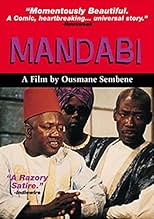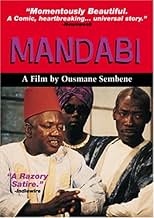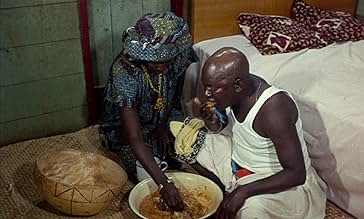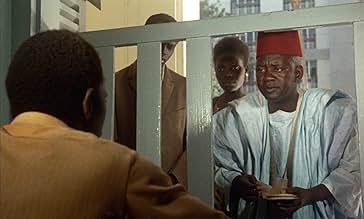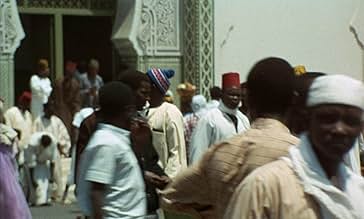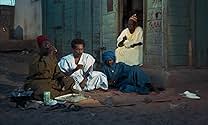A money order from a relative in Paris throws the life of a Senegalese family man out of order. He deals with corruption, greed, problematic family members, the locals and the changing from ... Read allA money order from a relative in Paris throws the life of a Senegalese family man out of order. He deals with corruption, greed, problematic family members, the locals and the changing from his traditional way of living to a more modern one.A money order from a relative in Paris throws the life of a Senegalese family man out of order. He deals with corruption, greed, problematic family members, the locals and the changing from his traditional way of living to a more modern one.
- Awards
- 1 nomination total
- Méty the First Wife
- (as Yunus Ndiay)
- M'barka the Shopkeeper
- (as Mustapha Ture)
- Imam
- (as Serine Ndiay)
- Abdu the Nephew
- (as Moussa Diuf)
- Madiagne Diagne the 2nd Neighbor
- (uncredited)
- Bah the Postman
- (uncredited)
- Public Writer at the Post Office
- (uncredited)
- Gorgui Maïssa the 1st Neighbor
- (uncredited)
- Director
- Writer
- All cast & crew
- Production, box office & more at IMDbPro
Featured reviews
A nice find
It's pretty striking how this man absolutely rules the roost over his wives at home, but is almost helpless in a world that is modernizing around him. He's been unemployed for four years, can't read (at least the French he needs to), and is often at the mercy of people far more savvy than him. In trying to get the proper forms filled out to get an identity card, which can then be used to cash the money order, he's asked for his date of birth, and he doesn't even know that, just that he was born "sometime around 1900." He can barely keep his oversized outfit from poofing out while walking around, a contrast to how elegant his wives are while they stroll around. He's a petty tyrant at home, threatening his wives with a backhand and having them wait on him, hardly a sympathetic figure, but almost a child in the world, and it's hard not to empathize with his growing humiliation.
Eight years into its independence, there is a criticism of Senegal here - how French was still the official language despite most of its citizens only speaking Wolof or Arabic, how women were being treated, how good people lived in poverty, and how layers of corruption existed in the system, including the new bourgeoisie. There is quite a contrast to the modern home of the man's nephew, and it's soul crushing how he takes advantage of his own uncle, perhaps the ultimate statement from Sembene of capitalism devouring people.
On top of its sociopolitical messages, this is a beautiful film. The colors in the fabrics and décor are rich and gorgeous, and the traditional music composed by Sembène is a treat to listen to. The film moves along with good pace, and the storytelling isn't forced or preachy. Quite a nice little find.
Modest Film of Post-Colonial Senegal
People are the Same
Too often found in Islamic or poorly educated populations.
One of the best Movies that was Similar of Modern Thailand
An African Mix of Bicycle Thieves and The Trial
Mandabi is partially based on Sembene's short story "The Money- Order". In it an illiterate, middle-aged man attempts to cash a money-order sent by a family member who has emigrated to Paris. Due to the newly independent country's rapidly spreading corruption, a burgeoning criminal underclass, and the general incompetence of government officials, Ibrahim (Gueye) struggles to accomplish what is otherwise a simple goal.
Senegal circa 1968 was administered by the largely socialist government of President Leopold Senghor. Senghor favored close ties with former colonialist France which ran counter to long brewing resentment and popular thought among other African nations who viewed France, Britain, Belgium et al. as oppressors. Underneath the film's strong sense of irony and absurdity you get the sense that the bureaucracy (and thus the government) that controls the fate of Ibrahim is completely foreign and unnaturally weak. It operates as a tool of submission and dehumanization to someone like Ibrahim who is un-wanting or unwilling to "modernize" yet for his nephew (Diouf) and the local shop keeper (Ture) whom represent a new generation easily manages to circumvent the bureaucracy in favor of a black market. This theme is further mirrored in Sembene's satirical zenith of El Hadji (Thierno Leye) impotence in the film Xala.
Yet in Mandabi, the satire, while more subdued than Xala feels more damning towards colonization as a political system and the authoritarianism of post-colonial African society. Ibrahim hopes familial ties and a few honest favors will get him what he wants but due in-part by traditionalism mesh-mashing with multiple systems of oppression, Ibrahim can only count on his first wife's (N'Diaye) constant berating.
Ibrahim's constant struggle mirrors that of the protagonist in Bicycle Thieves (1948). Yet while that film's neo-realist flair was partially the result of war, Mandabi endeavors amid a maze of post- colonial chaos with the new generation jockeying for absolute power. Dark, frustrating and heartbreaking Mandabi showcases a story and by extension a country where authority is an unnatural corruption and only rascals win.
Did you know
- TriviaFirst film made in an African language: Wolof, which is the most widely spoken language in Senegal.
- GoofsIn the scene where Ibrahima's nephew tells him that his money was stolen by a pickpocket, Ibrahima is wearing a hat with a green, white and yellow pattern and a white pointed end. When he and his nephew walk to the car, he suddenly wears a fez, and when they arrive at Ibrahima's home, he is again wearing the patterned hat.
- Quotes
Ibrahim Dieng: To tell you the truth, decency has become a sin in this country. And that's why I'm going to become a wolf among wolves! I too will become a thief and a liar!
- ConnectionsReferenced in L'envers du décor (1980)
- How long is Mandabi?Powered by Alexa
Details
- Release date
- Countries of origin
- Languages
- Also known as
- The Money Order
- Filming locations
- Dakar, Senegal(Centre town, far shot of the mosque, and suburbs.)
- Production companies
- See more company credits at IMDbPro

